– History / Why did Mussolini enter the futile war with Greece and how was Albania used?! –
Memorie.al / With the Greek campaign, Mussolini wanted to imitate Hitler’s lightning war, to increase Italy’s prestige in the Balkans. But instead, he suffered one of his greatest failures. Below, Lapsi.al brings excerpts from the article “Why did we go there” by Matteo Liberti, published in “Focus Storia”. LET’S BREAK THE ENEMY’S BACK. “I told you that we will break the Negus’ back. Now, with the same absolute certainty, I tell you that we will break the back of Greece”. This is what the Duce said on November 18, 1940, about the military campaign that was taking place in Greece, which in his intentions was to repeat the Ethiopian venture of 1936 (against the Negus, Emperor Haile Selassie), but which for almost a month had seen the Italian soldiers in very serious difficulties!
He sank to the point where he would eventually beg Hitler to revive the fortunes of what journalist Indro Montanelli defined as; “a boast by Mussolini”. But when and why did the Duce get involved in Greek territories?
PRETEXT
“Greece was governed at the time by Prime Minister Ioannis Metaxas, a former general who, starting in 1936, had created – supported by King George II – a regime in some ways similar to the fascist one”, – says Marco Clementi, a researcher in the History of Eastern Europe, at the University of Calabria.
“Although he declared himself an admirer of the Duce, Metaxas had to deal with the geopolitical context of Greece, involved in fierce tensions with its Albanian, Bulgarian, Yugoslav and Turkish neighbors. A scenario that pushed him to keep his feet on both sides, establishing good relations even with Great Britain, a power that had many positions in contrast to the Muslims”.
NEUTRAL GREECE
Relations between Greece and Italy took a bad turn in 1923, when the Italian general Enrico Tellini, sent to demarcate the borders between Greece and Albania, was killed near Ioannina. Relations between the two countries had improved subsequently, but when in the spring of 1939, Italy invaded Albania for the second time in its history, it caused a new alarm among its Greek neighbors.
“These concerns increased with the outbreak of World War II, a conflict in which Italy, allied with Germany through the “Pact of Steel”, entered on June 10, 1940, declaring war on France and Great Britain. For its part, Greece remained neutral” – says Clementi.
THE CHOICE
The decision to attack the Greeks was made by the Duce based on political and not strategic-military considerations. Given the successes that the Nazis were achieving, he believed that it was necessary to carry out a parallel action that would balance him with Hitler’s prestige. If possible, imitating the blitzkrieg, theorized by the Germans themselves.
“Since 1936, the year of the Ethiopian enterprise, Mussolini had increasingly turned towards foreign countries, with the idea of building an empire that would reflect the glories of the Roman one”, – continues Clementi. “As for the alliance with Hitler, it was not as equal as the Duce believed, since the Nazi leader, in fact, thought only of German interests.”
WRONG ASSUMPTIONS
To Mussolini’s expansionist plans and dormant rivalry with the Führer, was added the belief that the Greeks (who in the regime’s propaganda were seen as an “inferior race”) and the English were conspiring behind his back. This led to the decision to invade Greece. A move that could have also undermined English hegemony in the Mediterranean, a thorn in the side of the Italian navy.
Finally, strengthened in his opinion by the reports of the Foreign Minister, Galeazzo Ciano, the Duce became convinced that the operation would be favored by the corruption of local politicians, by the discontent of the border peoples – whom he imagined were ready to support the invader – and, in general, by the Greek military weakness. It did not go that way…!
PREPARATION
Excluding any possibility of a diplomatic agreement with Metaxas (for whom an alliance with Italy would mean creating tensions with the British and its Balkan neighbors), the military commanders suggested that at least 20 divisions were needed to fight, to be sent to Greece from Albania.
Specifically, the strategy was to occupy the city of Thessaloniki and the Ionian Islands and then proceed with the complete occupation of Greek territory. To this end, between 11 and 12 August 1940, Ciano and Mussolini met in Rome with Sebastiano Visconti Prasca, commander of the troops in Albania, ordering him to prepare the soldiers for the attack; “as soon as possible”.
INTELLIGENCE CONFUSION
“Meanwhile, the intelligence services of the SIM (Military Information Service) had expressed many reservations about Mussolini’s intentions. However, he did not listen to reason, convinced that Italy should play in the Balkans the geopolitical role that Austria-Hungary, a political entity that had already disappeared from the Great War, had already played”, – says Klementi.
“As if this were not enough, Mussolini was short-sighted in not recognizing his ‘submission’ to Hitler, on the contrary convincing himself that he could quickly make Germany ‘a pawn in our game’. Given this situation, what was missing was a propaganda campaign to prepare the Italians for the intervention and a ‘casus belli’ to justify it”, – says the historian.
LIES
Starting from August 11, 1940, the name of the Albanian Daut Hoxha became famous and his story ended up in all the newspapers. In Italy he is unknown, but in Albania he is still a hero today: a patriot barbarically murdered by the Greeks for supporting the independence of Chameria, a territory on the border between Albania and Greece and disputed between the two countries.
“The death of Daut Hoxha became a pretext for a violent anti-Greek campaign, with Italy presenting itself as the champion of Albanian claims”, – says the historian. “In this situation, on August 15, the Italian submarine ‘Delfino’ sank a Greek cruiser near the island of Tinos, but Italy did not accept any responsibility, trying to blame it on the English. The bluff did not work and only increased the level of tension”!
Surprisingly!
When, on October 11, Mussolini learned that the Nazis were about to station their contingent in Romania, near some oil fields, angry that he had not been consulted, he decided to take action. He vowed to pay Hitler back in kind. He will learn from the newspapers that I have invaded Greece. “Thus, on 15 October, in a meeting with the military high command at Palazzo Venezia (including Chief of Staff Pietro Badoglio, who offered no resistance), the Duce ordered the invasion to begin.
It was then warned that if the Italians were thwarted, any form of hostility would be crushed by force of arms. In parallel, several border incidents would bring British intervention and the Greeks to the fore. The deadline for Greece to accept the Italian terms was set at 06:00 that same day (it was given at 03:00) and Metaxas simply said laconically: “So this is war”!
The Italian soldiers – who, despite the initial demands of the military leaders, were organized into only 6 divisions – crossed the border between Albania and Greece, starting a march that would be stopped very quickly by the courageous resistance of the Greek soldiers, supported by by the English and, as Graz had predicted, by large sections of the population.
THE GERMANS ARE COMING!
“The difficulties that immediately confronted the Italians were of the most varied kind,” continues Clementi. Partly due to numerical inferiority, partly to the difficult terrain of the Greek territory, but above all to a general lack of means and organization. Thrown into disarray, the soldiers found themselves embroiled in a grueling war of attacks and counterattacks. Hitler “pulled the chestnuts out of the fire” when, in the spring of 1941, he ordered his troops to invade Yugoslavia and Greece.
THE LEADER’S DISAPPOINTMENT
The two Balkan countries surrendered within a few days. On April 17, Yugoslavia surrendered, and on the 21st, Greece, an event that frustrated the Duce, who was once again overshadowed by the Führer.
“To tell you the truth, Hitler would have gladly done this without committing himself to the Balkans. This operation risked drawing larger British forces into the area and delaying – as it did – the plan to invade the Union of Soviet Socialist Republics,” explains Clementi.
Nevertheless, the Duce and his German ally continued to divide territory with Italy, now in possession of the Dodecanese, while also taking control of mainland Greece (with the exception of Macedonia), Athens, the Peloponnese, the Cyclades, part of the Sporades, eastern Crete, and all of the Ionian Islands.
FINAL BALANCE SHEET
“Despite the serious mistakes made by the high command in planning the war, the Italians managed to put up a good resistance to the Greek counterattack. Even if they did not win the war, it cannot be said that they completely lost it”, – concludes Clementi.
However, taking everything into account, Greece’s back was not broken, while Mussolini’s vanity broke the lives of many soldiers about whom, with contempt, on Christmas 1940, he had said: “This snow and this cold are good. This is how half-hearted people die and this mediocre Italian race improves”! Memorie.al




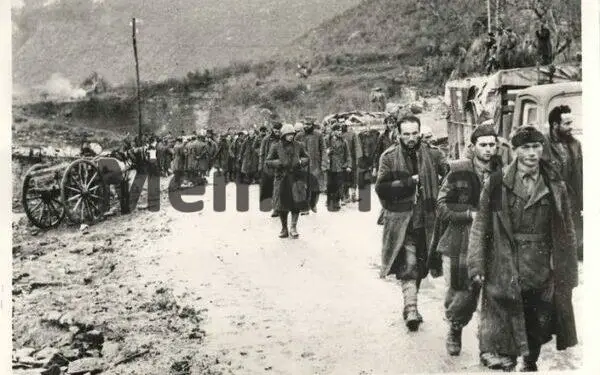
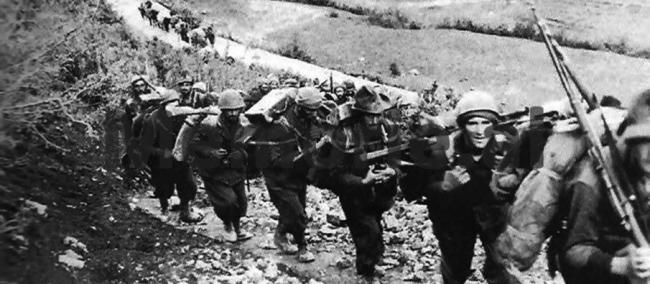
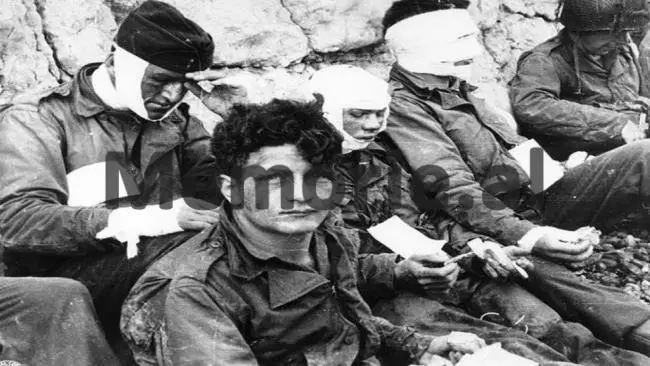
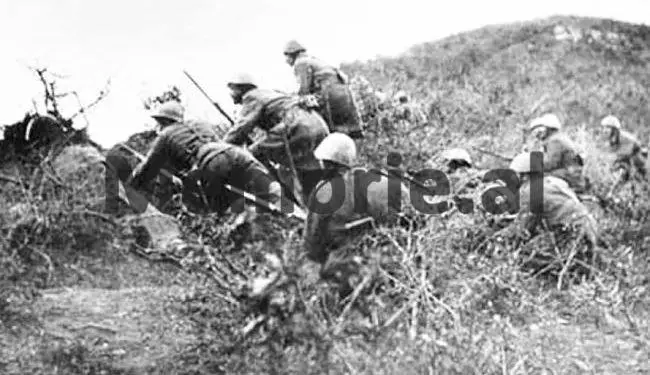
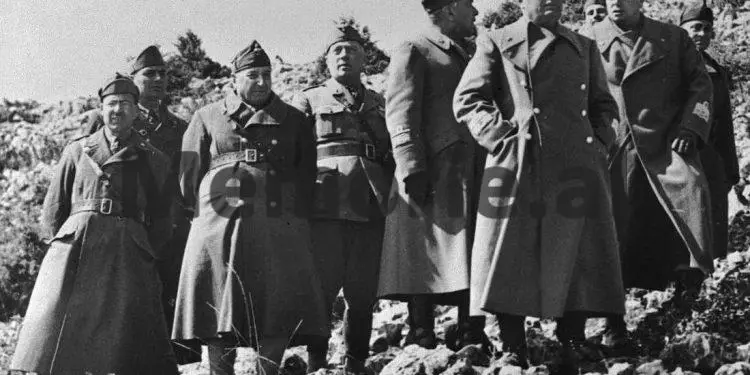
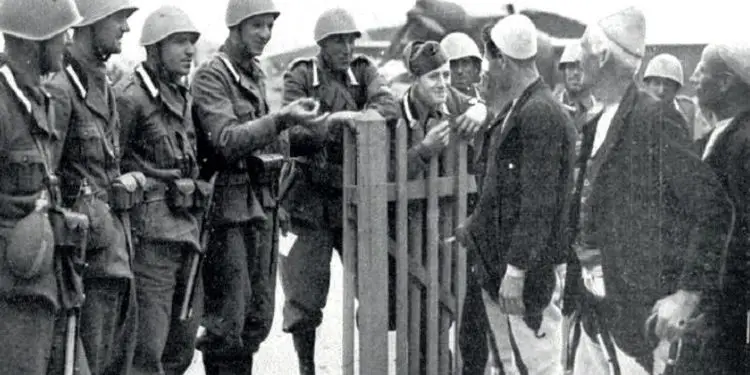



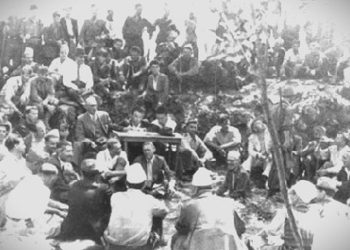
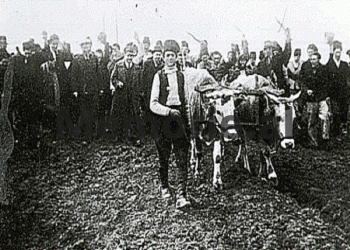
![“They have given her [the permission], but if possible, they should revoke it, as I believe it shouldn’t have been granted. I don’t know what she’s up to now…” / Enver Hoxha’s letter uncovered regarding a martyr’s mother seeking to visit Turkey.](https://memorie.al/wp-content/uploads/2026/01/Dok-1-350x250.jpg)
